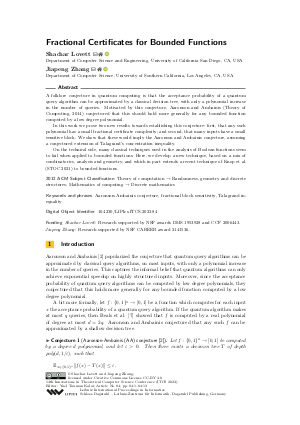Fractional Certificates for Bounded Functions
Authors
Shachar Lovett  ,
Jiapeng Zhang
,
Jiapeng Zhang 
-
Part of:
Volume:
14th Innovations in Theoretical Computer Science Conference (ITCS 2023)
Part of: Series: Leibniz International Proceedings in Informatics (LIPIcs)
Part of: Conference: Innovations in Theoretical Computer Science Conference (ITCS) - License:
 Creative Commons Attribution 4.0 International license
Creative Commons Attribution 4.0 International license
- Publication Date: 2023-02-01
File

PDF
LIPIcs.ITCS.2023.84.pdf
- Filesize: 0.67 MB
- 13 pages
Document Identifiers
Subject Classification
ACM Subject Classification
- Theory of computation → Randomness, geometry and discrete structures
- Mathematics of computing → Discrete mathematics
Keywords
- Aaronson-Ambainis conjecture
- fractional block sensitivity
- Talagrand inequality
Metrics
- Access Statistics
-
Total Accesses (updated on a weekly basis)
0PDF Downloads0Metadata Views
Abstract
A folklore conjecture in quantum computing is that the acceptance probability of a quantum query algorithm can be approximated by a classical decision tree, with only a polynomial increase in the number of queries. Motivated by this conjecture, Aaronson and Ambainis (Theory of Computing, 2014) conjectured that this should hold more generally for any bounded function computed by a low degree polynomial. In this work we prove two new results towards establishing this conjecture: first, that any such polynomial has a small fractional certificate complexity; and second, that many inputs have a small sensitive block. We show that these would imply the Aaronson and Ambainis conjecture, assuming a conjectured extension of Talagrand’s concentration inequality. On the technical side, many classical techniques used in the analysis of Boolean functions seem to fail when applied to bounded functions. Here, we develop a new technique, based on a mix of combinatorics, analysis and geometry, and which in part extends a recent technique of Knop et al. (STOC 2021) to bounded functions.
Cite As Get BibTex
Shachar Lovett and Jiapeng Zhang. Fractional Certificates for Bounded Functions. In 14th Innovations in Theoretical Computer Science Conference (ITCS 2023). Leibniz International Proceedings in Informatics (LIPIcs), Volume 251, pp. 84:1-84:13, Schloss Dagstuhl – Leibniz-Zentrum für Informatik (2023)
https://doi.org/10.4230/LIPIcs.ITCS.2023.84
BibTex
@InProceedings{lovett_et_al:LIPIcs.ITCS.2023.84,
author = {Lovett, Shachar and Zhang, Jiapeng},
title = {{Fractional Certificates for Bounded Functions}},
booktitle = {14th Innovations in Theoretical Computer Science Conference (ITCS 2023)},
pages = {84:1--84:13},
series = {Leibniz International Proceedings in Informatics (LIPIcs)},
ISBN = {978-3-95977-263-1},
ISSN = {1868-8969},
year = {2023},
volume = {251},
editor = {Tauman Kalai, Yael},
publisher = {Schloss Dagstuhl -- Leibniz-Zentrum f{\"u}r Informatik},
address = {Dagstuhl, Germany},
URL = {https://drops.dagstuhl.de/entities/document/10.4230/LIPIcs.ITCS.2023.84},
URN = {urn:nbn:de:0030-drops-175871},
doi = {10.4230/LIPIcs.ITCS.2023.84},
annote = {Keywords: Aaronson-Ambainis conjecture, fractional block sensitivity, Talagrand inequality}
}
Author Details
- Department of Computer Science and Engineering, University of California San Diego, CA, USA
Funding
- Lovett, Shachar: Research supported by NSF awards DMS 1953928 and CCF 2006443.
- Zhang, Jiapeng: Research supported by NSF CAREER award 2141536.
References
-
Scott Aaronson. Quantum certificate complexity. Journal of Computer and System Sciences, 74(3):313-322, 2008.

-
Scott Aaronson and Andris Ambainis. The need for structure in quantum speedups. Theory of Computing, 10(6):133-166, 2014.

-
Andris Ambainis, Krišjānis Prūsis, and Jevgenijs Vihrovs. On block sensitivity and fractional block sensitivity. Lobachevskii Journal of Mathematics, 39(7):967-969, 2018.

- Anurag Anshu, Shalev Ben-David, and Srijita Kundu. On query-to-communication lifting for adversary bounds. arXiv preprint, 2020. URL: http://arxiv.org/abs/2012.03415.
-
Arturs Backurs and Mohammad Bavarian. On the sum of L₁ influences. In 2014 IEEE 29th Conference on Computational Complexity (CCC), pages 132-143. IEEE, 2014.

- Nikhil Bansal, Makrand Sinha, and Ronald de Wolf. Influence in completely bounded block-multilinear forms and classical simulation of quantum algorithms. arXiv preprint, 2022. URL: http://arxiv.org/abs/2203.00212.
-
Robert Beals, Harry Buhrman, Richard Cleve, Michele Mosca, and Ronald de Wolf. Quantum lower bounds by polynomials. Journal of the ACM (JACM), 48(4):778-797, 2001.

-
Irit Dinur, Ehud Friedgut, Guy Kindler, and Ryan O'Donnell. On the Fourier tails of bounded functions over the discrete cube. In Proceedings of the thirty-eighth annual ACM symposium on Theory of computing, pages 437-446, 2006.

-
Yuval Filmus, Hamed Hatami, Nathan Keller, and Noam Lifshitz. On the sum of the L₁ influences of bounded functions. Israel Journal of Mathematics, 214(1):167-192, 2016.

-
Justin Gilmer, Michael Saks, and Srikanth Srinivasan. Composition limits and separating examples for some Boolean function complexity measures. Combinatorica, 36(3):265-311, 2016.

- Nathan Keller and Ohad Klein. Quantum speedups need structure. arXiv preprint, 2019. Paper was withdrawn because it contained an error. URL: http://arxiv.org/abs/1911.03748.
-
Alexander Knop, Shachar Lovett, Sam McGuire, and Weiqiang Yuan. Log-rank and lifting for AND-functions. In Proceedings of the 53rd Annual ACM SIGACT Symposium on Theory of Computing, pages 197-208, 2021.

-
Raghav Kulkarni and Avishay Tal. On fractional block sensitivity. Chicago J. Theor. Comput. Sci, 8:1-16, 2016.

-
L Lovász. 2-matchings and 2-covers of hypergraphs. Acta Mathematica Hungarica, 26(3-4):433-444, 1975.

- Gatis Midrijanis. On randomized and quantum query complexities. arXiv preprint, 2005. URL: http://arxiv.org/abs/quant-ph/0501142.
-
Ashley Montanaro. Some applications of hypercontractive inequalities in quantum information theory. Journal of Mathematical Physics, 53(12):122206, 2012.

-
Noam Nisan and Mario Szegedy. On the degree of Boolean functions as real polynomials. Computational complexity, 4(4):301-313, 1994.

-
Ryan O'Donnell, Michael Saks, Oded Schramm, and Rocco A Servedio. Every decision tree has an influential variable. In 46th Annual IEEE Symposium on Foundations of Computer Science (FOCS'05), pages 31-39. IEEE, 2005.

-
Avishay Tal. Properties and applications of Boolean function composition. In Proceedings of the 4th conference on Innovations in Theoretical Computer Science, pages 441-454, 2013.

-
Michel Talagrand. Concentration of measure and isoperimetric inequalities in product spaces. Publications Mathématiques de l'Institut des Hautes Etudes Scientifiques, 81(1):73-205, 1995.

